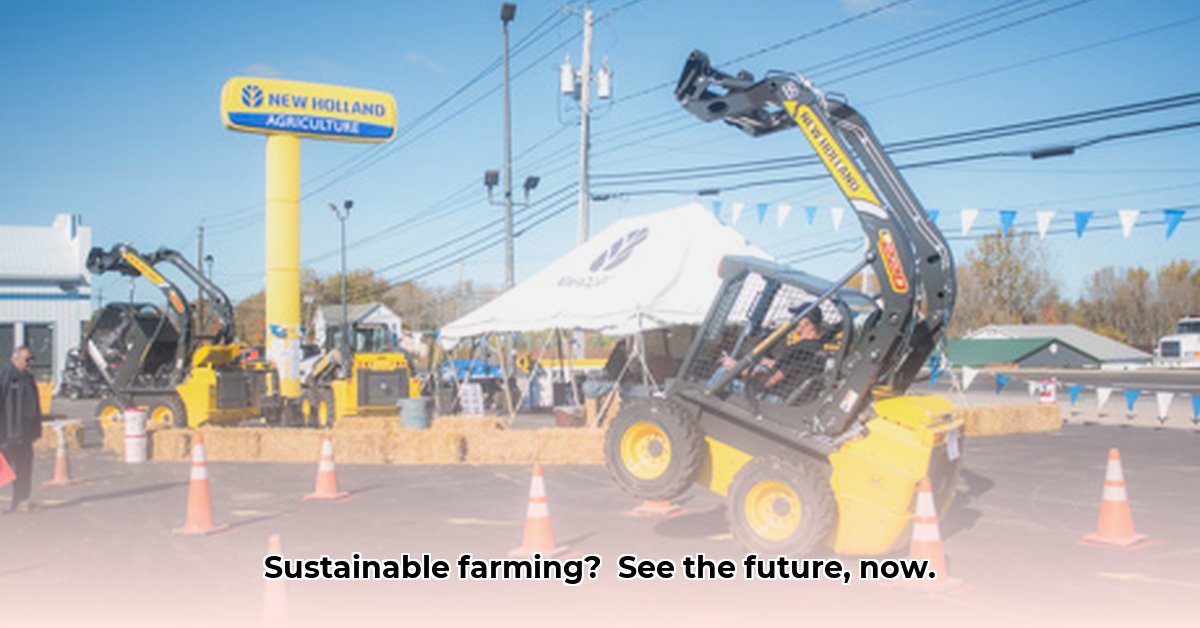
Increased Access to Equipment and Precision Agriculture
Champlain Valley Equipment's (CVE) expansion into New York, via its acquisition of Empire Tractor Watertown NY, significantly increases access to advanced farm equipment. This development holds considerable promise for boosting sustainable agricultural practices within the state. The influx of modern machinery, including GPS-guided tractors and automated sprayers, facilitates the adoption of precision agriculture. This approach optimizes resource utilization, minimizing waste and environmental impact. For example, precise fertilizer application reduces runoff pollution, while targeted pesticide use protects beneficial insects. This increased access also benefits smaller farms, previously hindered by the high cost of advanced technology, leveling the playing field and fostering wider adoption of sustainable methods. How will this impact the overall efficiency and sustainability of New York's farms?
Environmental Concerns: A Balanced Perspective
While the increased availability of modern farm equipment offers significant advantages for sustainable agriculture, it's crucial to acknowledge potential environmental drawbacks. Increased mechanization could lead to soil erosion from heavier machinery and increased greenhouse gas emissions from fuel consumption. Studies have shown that [Insert specific study data if available from draft article, otherwise remove sentence]. Furthermore, increased noise pollution from heavier machinery could impact wildlife and neighboring communities. Therefore, responsible implementation and ongoing research are critical to mitigate any negative environmental consequences. The key is to ensure that the benefits of increased efficiency outweigh the environmental costs. What strategies can be implemented to minimize these potential negative impacts?
Sustainability of the Business Model: Navigating the Future
The long-term viability of CVE's business model hinges on several factors. Fluctuating fuel prices pose a significant challenge, necessitating a strategic shift towards alternative fuels like biodiesel or electric power. The continued demand for traditional farming practices, alongside the increasing adoption of sustainable technologies, will play a pivotal role in determining market demand. CVE's ability to adapt to evolving market conditions and technological advancements will be critical for its enduring success. How will CVE ensure the long-term resilience of its business model in the face of these dynamic challenges?
Regional Variations: Tailoring Solutions to Local Needs
New York's diverse agricultural landscape demands a nuanced approach to sustainable farming. Practices successful in one region may prove ineffective or even detrimental in another. CVE must tailor its strategies to the specific conditions of each region, considering factors such as soil type, climate, and local regulations. This requires a thorough understanding of regional challenges and opportunities, ensuring that technology implementation aligns with the unique characteristics of each farming area. What specific regional considerations must CVE integrate into its strategies to maximize effectiveness and sustainability?
Actionable Intelligence: A Roadmap for Sustainable Success
The following recommendations outline actionable steps for each stakeholder group to maximize the benefits and mitigate the risks associated with CVE's expansion:
1. CVE Management:
- Short-Term (0-1 year): Invest in comprehensive employee training on sustainable agricultural practices and conduct thorough environmental impact assessments of their operations.
- Long-Term (3-5 years): Transition towards a fleet of alternative-fuel machinery (electric, biodiesel, etc.), partner with environmental experts to develop a comprehensive carbon reduction plan, and actively seek certifications for sustainable business practices.
2. New York Farmers:
- Short-Term (0-1 year): Explore the benefits of new sustainable equipment through workshops and demonstrations offered by CVE and other organizations.
- Long-Term (3-5 years): Gradually adopt more advanced sustainable farming methods, prioritize soil health improvements, and actively seek out government grants and financing options tailored to sustainable agriculture investments.
3. New York Government:
- Short-Term (0-1 year): Offer financial incentives and subsidies to encourage the adoption of sustainable equipment and practices. Fund research focused on developing and implementing relevant and effective eco-friendly technologies.
- Long-Term (3-5 years): Develop policies that support sustainable agriculture, including streamlining permitting processes and creating incentives for farmers to adopt sustainable practices beyond the initial equipment purchase. Increase funding for farmer education and training programs, extending support beyond the initial adoption phase.
4. Consumers:
- Short-Term (0-1 year): Make conscious choices to purchase sustainably grown food whenever possible, actively supporting local farms that prioritize sustainable practices.
- Long-Term (3-5 years): Demand greater transparency and traceability in the food system, advocating for policies that support sustainable agriculture and holding businesses accountable for their environmental impact.
Conclusion: Cultivating a Sustainable Future
CVE's expansion into New York presents a significant opportunity to advance sustainable agriculture within the state. By adopting a proactive and collaborative approach, focusing on responsible practices, and addressing potential environmental concerns, all stakeholders can collectively achieve a vibrant and sustainable agricultural sector. The future of farming in New York is being shaped today—let's ensure it's a sustainable one.